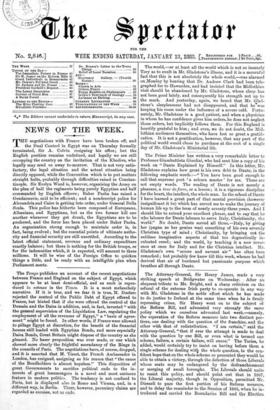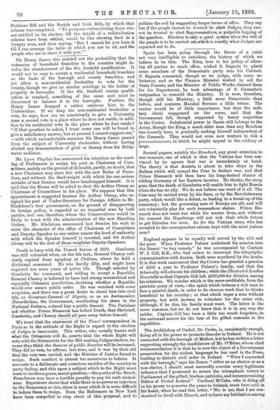The Attorney-General, Sir Henry James, made a very striking speech
at Bridgwater on Wednesday. After an eloquent tribute to Mr- Bright, and a sharp criticism on the refusal of the extreme Irish party to co-operate in any way with Mr. Gladstone in the noble effort which he has made to do justice to Ireland at the same time when he is firmly repressing crime, Sir Henry went on to the subject of the Reform Bill, and advocated very strongly the same policy which we ourselves advocated last week,—namely, the separation of the Reform measure into two distinct por- tions, one dealing with the question of the franchise, and the other with that of redistribution. "I am certain," said the Attorney-General, "that if ever the attempt is made to deal with the question by one Bill, or even what is termed one scheme, failure, a certain failure, will ensue." The Tories, he added, would certainly try to insist on having before them a single scheme for dealing with the whole question, in the con- fident hope that on the whole scheme so presented they would be able to obtain a victory, through the defection of those Liberals whose seats may be endangered by the disfranchisement or merging of small boroughs. The Liberals should unite to resist this policy, and should point out that in 1867, the Liberal majority, though in Opposition, permitted Mr. Disraeli to pass the first portion of his Reform measure, and to delay the remainder to the Session of 1868, when he in- troduced and carried the Boundaries Bill and the Election
Petitions Bill and the Scotch and Irish Bills, by which that scheme was completed. " To postpone enfranchising those who are entitled to be electors till the details of a redistribution scheme have been settled, would be like showing food to a hungry man, and then saying, But I cannot let you have it till I can arrange the table at which you are to sit, and the people who are to share it with you.."'



































